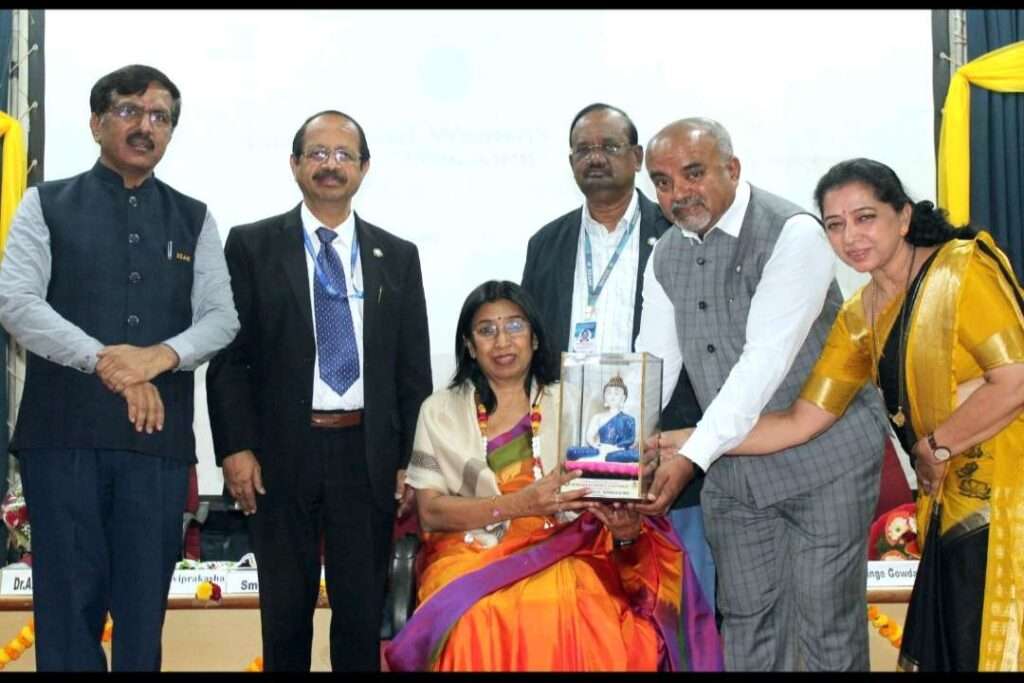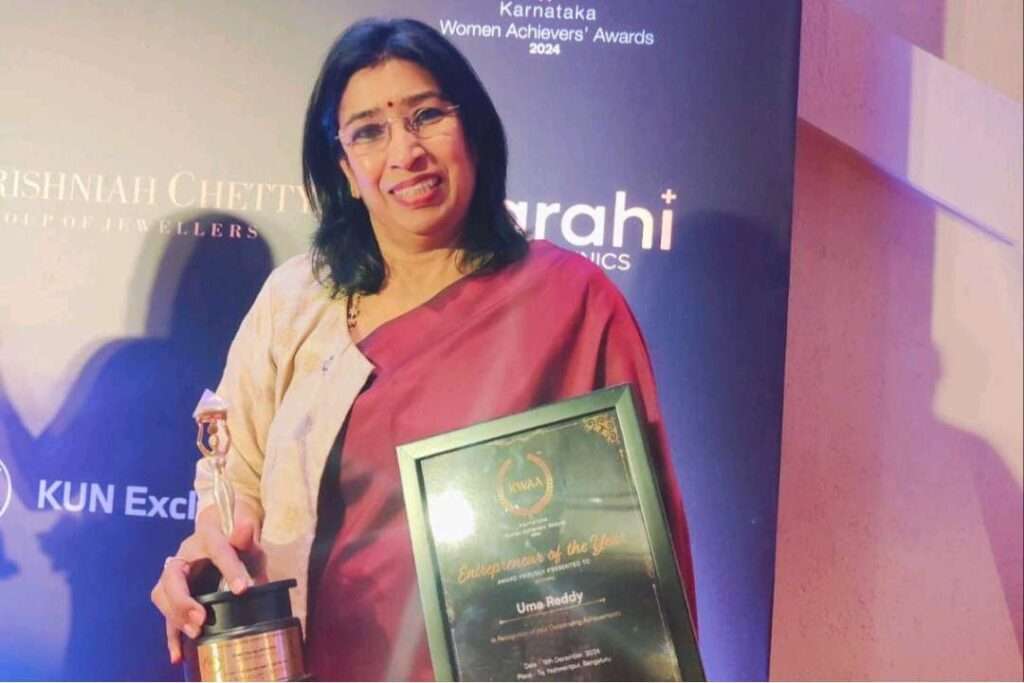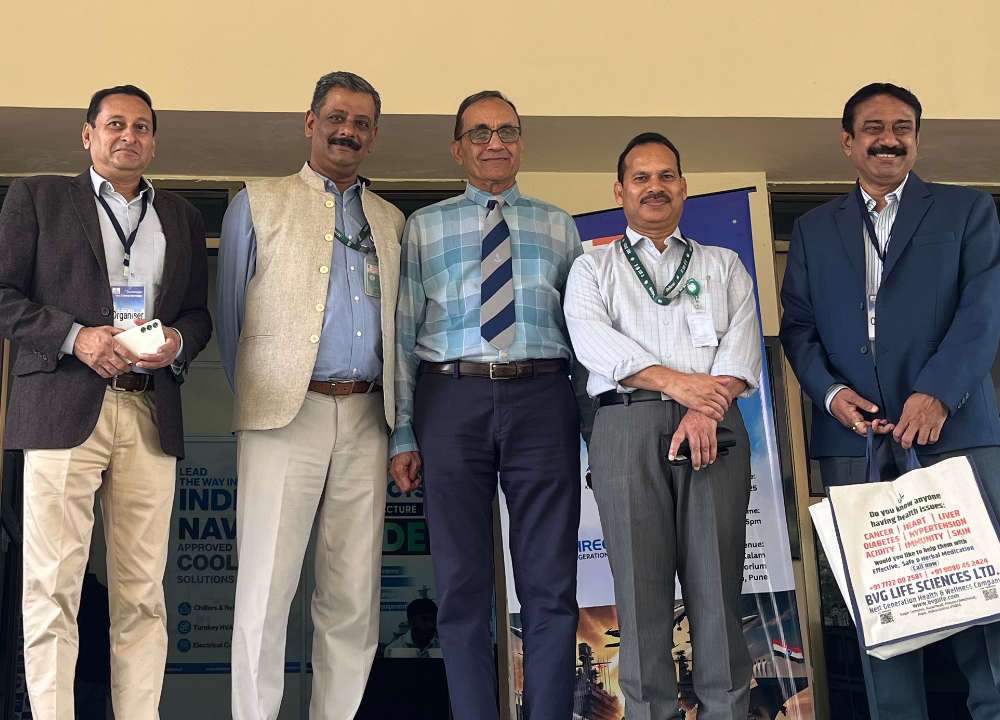A first-generation entrepreneur with 41 years of experience, Uma Reddy started her journey when entrepreneurship was barely recognised. She has earned recognitions like the National Award for Women Entrepreneurs and the Karnataka Rajyotsava Award, has held key leadership roles in FKCCI, UBUNTU, and eMERG, served on national councils, and contributed to global forums. She is passionate about MSME and women’s empowerment and continues to direct entrepreneurial growth in India.
Uma Reddy is the Managing Director of Hitech Magnetics and Electronics Private Limited. She holds a Bachelor of Engineering from the University of Visvesvaraya College of Engineering and started her journey in entrepreneurship in 1984. She has held crucial leadership positions, serving as Senior Vice President at FKCCI, Vice President of the UBUNTU Consortium, and Founder President of eMERG.
She has also contributed to esteemed councils such as the Prime Minister’s Council for MSMEs and the National Manufacturing Competitiveness Council. Her collaboration with UNDP evaluation missions and participation in the US State Department’s IVLP program show her passion for empowering MSMEs and women.
Earlier in the 80s, when Uma Reddy started, business wasn’t something people typically looked at as a career option. Job security, especially in a PSU, was the preferred choice, making entrepreneurship a rare path. She says, “It was difficult to gain people’s trust, every time you have to convince yourself as an entrepreneur that I can also deliver it”.
There were no schemes for enterprise development or funding support in those days. Today, there is a startup ecosystem with angel investors, VC funding, and FDIs, but back then, everything was a challenge, Uma shares. Hence, she believes comparisons aren’t fair because the circumstances were completely different.
According to Uma, another challenge was the limited number of opportunities for the private manufacturing sector in the country. She further explains that in present times, there is an open market economy where even the defense sector is open to private players. However, earlier, defense was entirely in the public sector, so the only way to do business in that space was by working with PSUs.
For Uma, another hurdle was the rapid growth of technology. Particularly in electronics, evolution was happening rapidly, and obsolescence is a constant challenge. Staying ahead meant keeping an eye on emerging technologies and adapting to remain relevant in the industry.
Gaining Trust has always been a Difficult Task
On a personal level, Uma says, “When I started, I didn’t have much to compare my journey with. There were hardly any women in the sector, and women entrepreneurs were a rarity. So, I focused entirely on my work, doing what needed to be done without thinking too much about comparisons”.
However, she faced some challenges as a woman in the manufacturing sector. One of the biggest challenges was the trust factor. Women have to put extra effort into proving their authenticity and capability. She says, “Every step of the way, I had to keep proving myself, again and again, just to establish credibility”.
Even after proving herself, one particular challenge she faced was that, while people trusted her to deliver, they hesitated when it came to awarding large orders or major business deals. There was always a reluctance to entrust women with high-value projects, despite knowing their delivery capability.
Uma believes that even today, women continue to face challenges in business and trust issues remain significant. It’s something that almost every woman entrepreneur has to deal with at some point in her journey.
Interning in Holidays to Manufacturing Entrepreneurship
When Uma’s parents discovered she was going into the manufacturing and engineering industry, it surprised them. She shares, “In those days, there were only a few career options like engineering, medicine, or traditional degrees like BCom, BA, or BSc”. As Uma had taken engineering, she was expected to secure a job in a bank, as a field officer, in the corporate sector, or a PSU as an engineer. But becoming an entrepreneur was not something her parents would have imagined, she shares.

During her holidays, she started her business in a similar way to an internship. She remembers, “I didn’t even know the term ‘intern’ back then. My parents were somewhat aware that I was trying to do something, it was comforting to them, but they didn’t realise my seriousness”.
After completing her engineering, Uma got a job at Kirloskar Systems. However, Uma shares that her parents were once again stunned when she chose to continue her entrepreneurial career rather than take the job. In the initial days, she also had to take a loan from the bank, and since banks were not giving loans without collateral security, she had to approach her parents for support.
She says, “My parents were always there to support me in everything I pursued. They were very proud that I was trying to do something different”. From the beginning, including women in the company was a priority. She shares, “Today, around 90% of female workers are working in my company, and this has been a conscious decision throughout her journey”.
In 2001, she received the National Award for Women Entrepreneurs and, in 2005, the Karnataka Rajyotsava Award. Looking back on her 41-year journey, Uma takes immense pride in every product developed, manufactured, and delivered by her company. “The fact that we made it happen as a team gives me far more satisfaction than any awards,” she adds.
The company received several recognitions, such as the GE Performance Award, the Kiloskar Award, and the ABB Safety Award. However, Uma believes that while awards are valuable, what truly brings happiness is winning a project, securing the tender, manufacturing, supplying, and successfully completing a project on time. That sense of accomplishment is unmatched.
For Uma, one of the most beautiful aspects of her journey has been the people she works with. Many of her team members have been there for over 30 years at the management and operator levels. She believes that in an era where employee turnover is common, her company has built such a loyal and strong team that it truly feels like a family.
When her company received the GE Performance Award, it was a supplier for both Bharat Electronics and GE. Winning this award as the Best Supplier with Bharat Electronics, also present, was a significant moment in her journey. It was completely unexpected to her. “Those were the days before mobile phones, so the news came as a surprise only when I landed. That experience stands out as a moment of pride and happiness in my journey,” she shares.
Passion is Key: Ups & Downs are part of Career
Uma acknowledges that she never planned to become an entrepreneur; it came naturally to her. She explains, “I started designing for some of my uncles I knew, and I enjoyed the process. It was never a formal decision to start a business.”

She agrees that throughout her journey, there were moments when she felt overwhelmed, but she never thought of changing her career. Even if there were challenges, the doubt was temporary till the issue was resolved. She says, “These ups and downs are part of the career”.
Uma says balancing work and personal life has been about multitasking and perfecting the juggling act. Her business started before marriage, so she built her own company and family. She says, “Since I was the key person running the business, my work often took priority”. She believes that giving quality time, even if limited, makes a difference.
She also highlights the shift from core engineering to IT or other sectors. Unlike IT jobs, manufacturing involves shop floor work; not everyone might be comfortable with it. However, passion is the key. If manufacturing makes someone truly happy, they should pursue it regardless of societal expectations. Still, the number of women in manufacturing as entrepreneurs and employees is low.
Uma assumes that the lack of proper infrastructure in industrial areas is one of the challenges in India. In many other countries, manufacturing zones are well-equipped with childcare centers, clean environments, and essential facilities, making it easier for women to work in the sector.
Better infrastructure and additional support for women, both as business owners and employees, are necessary for the sector to grow. However, in India, industrial areas often lack even basic amenities like proper roads, sanitation, and waste management. This discourages people, especially women, from choosing manufacturing as a career.
Uma concludes with advice to women aspiring to enter the manufacturing industry to follow their passion.
“Whether as an entrepreneur or an employee, manufacturing is about the satisfaction of creating something tangible. Seeing a product come to life is a rewarding experience, but it requires perseverance. The first attempt may not always be successful; sometimes, it takes multiple trials to perfect a product. The key is to remain determined and keep pushing forward.”








